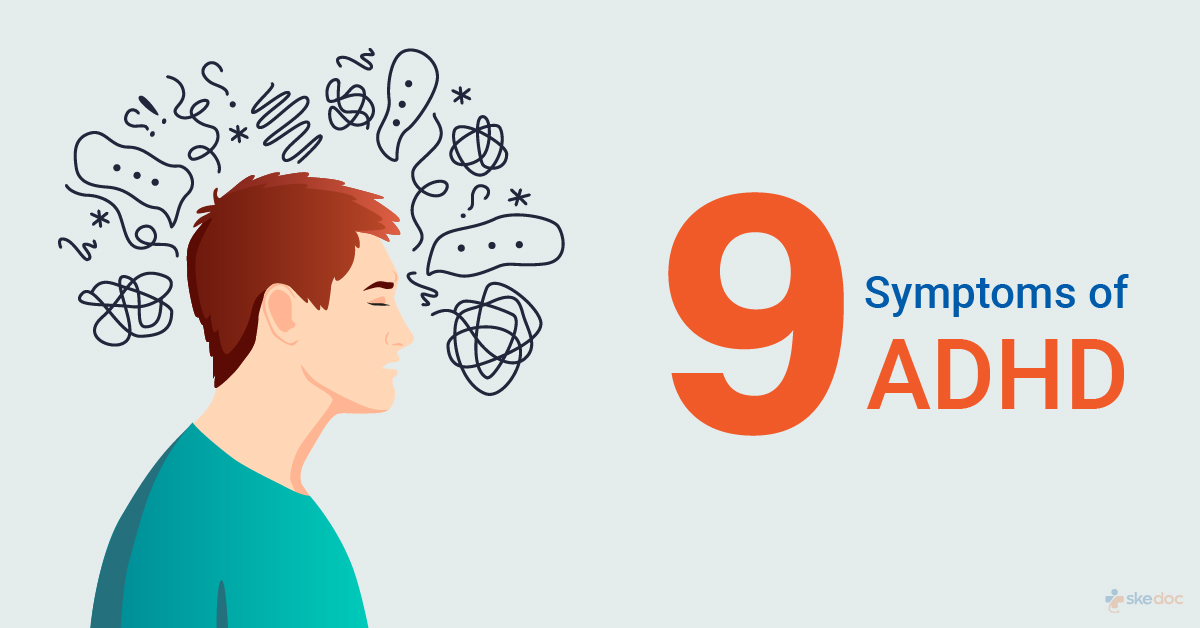Allergy
Blood Diseases
Bone & Joints
Brain
Cancer
Child Care
Cosmetic Surgery
Diabetes
Endocrinology
ENT
Eye
Gen Medicine
General Surgery
Heart
Kidney
Lifestyle
Liver & Digestive
Lung
Men’s Health
Mental health
Physiotherapy
Rheumatology
Skin and hair
Sleep Disorders
Spine
Transplant
Women Health
Thyroid
Vascular Surgery
9 Symptoms of ADHD You Should Know

What is ADHD?
ADHD is a neurodevelopmental disorder in which the affected individual suffers from problems of being inattentive, hyperactive, and impulsive in their behavior. Neurodevelopmental disorders are mental health conditions that result from poor or abnormal development of the nervous system and subsequent abnormal brain function that mainly affects emotions, memory, learning abilities, and self-control. Neurodevelopmental disorders like ADHD often tend to develop early and usually persist into adulthood.
What causes ADHD?
The exact cause of ADHD is not fully understood, but factors such as genetic factors, environmental factors, and factors that influence or affect the proper development of the central nervous system when the fetus or infant is developing can result in this condition. Factors that increase the risk of ADHD can include
- Family history of the condition – having a close relative such as a parent, brother, or sister with ADHD increases the risk in subsequent offspring.
- Toxins – exposure to harmful chemical compounds that are found in paints, solvents, etc., can also increase the risk of ADHD development due to the harmful effects of these substances on the development of the nervous system.
- Maternal Factors – the risk of ADHD increases in the child if the mother smoked, drank alcohol, or used recreational drugs during pregnancy.
- Premature Birth – individuals with a history of premature birth and low birth weight are also at a higher risk of developing ADHD.
What are the important symptoms of ADHD one should be aware of?
There are many different symptoms that can point to the presence of ADHD, and these are primarily classified as Symptoms of Inattention, Symptoms of Hyperactivity, and Symptoms of Impulsivity. It is not uncommon for children and even adolescents to be inattentive, hyperactive, or impulsive at some point or more than one point in their lives. But, for these symptoms to be identified as being a clinical presentation of ADHD it is required that
- These symptoms need to be present for a period of 6 months or more
- Symptoms need to be present in two different settings (such as school, home, outdoors, etc.)
- Symptoms need to be having a negative effect on the academic, social, or occupational functioning of the individual
- For individuals more than 17 years at least 5 or more symptoms need to be present
- For individuals less than 17 years at least 6 or more symptoms need to be present
- These symptoms should not be due to any other mental health disorder such as mood disorders, anxiety disorders, oppositional behavior (defiance, hostility, etc.), or seen during psychotic disorder episodes.
What are the Symptoms of Inattention that one should look out for?
The symptoms of inattention that are seen can include
- Failure to pay close attention to details and making mistakes in school work, work, or other activities
- Difficulty staying attentive (no sustained attention) in activities or work that requires time, such as lectures, lengthy tasks, etc.
- Failure to pay attention even when directly spoken to
- Failure to comply with instructions and finish an allotted task or work such as starting a task but leaving it unfinished due to loss of focus or getting distracted
- Poor organizational skills, inability to perform tasks that need to be done in a sequence, being messy, inability to keep materials or belongings in an organized manner, poor management of time, etc.
- Avoiding or being reluctant to engage in activities that require a long duration of mental effort such as schoolwork, school projects, examinations, preparing reports, etc.
- Tendency to easily misplace things that are required to complete a task or activity
- Tendency to get easily distracted or side-tracked from the current task by external and unrelated stimuli
- Tendency to forget daily activities and simple chores
What are the Symptoms of Hyperactivity one should look out for?
The symptoms of hyperactivity that are seen can include
- Being fidgety, squirming, or restless when seated
- Leaving the seat in situations when being seated is required or expected (such as in the classroom, or at work)
- Running about, climbing, or jumping in situations where it is inappropriate
- Inability to take part in any activities such as leisure activities, etc., in a quiet manner
- Talking excessively
- Uncomfortable or unable to stay seated for an extended time such as at restaurants, meetings, etc.
What are the Symptoms of Impulsivity?
The symptoms of impulsivity that are seen can include
- Inability to wait for their turn in a conversation, blurting out answers to questions before they are completed, or completing other people’s sentences inappropriately
- Inability to wait for their turn in social situations
- Interrupting others or intruding inappropriately such as intruding into others’ conversations, games, or activities, or using things belonging to other people without first taking their permission, etc.
The symptoms of ADHD may be noticeable as early as the age of 3 years or maybe seen later when the individual is an adolescent, but for confirmation of diagnosis, it is required that one or more of these are also present before the age of 12 years. The symptoms of ADHD may also be classified as being
- Predominantly Inattentive
- Predominantly Hyperactive/Impulsive
- Combined
When the aforementioned symptoms are seen disrupting day-to-day life, activities, and functioning of the individual, have persisted for 6 months or more, and are seen to exist in at least two different settings, it is important to seek the help of a psychiatrist near you. Early evaluation and management can help to prevent complications and improve the overall quality of the individual’s life.
Was this article helpful?
YesNo




